新概念英语第二册:第41课课文详解及语法解析.doc
裕兴新概念英语第二册笔记_第41课_课文讲解
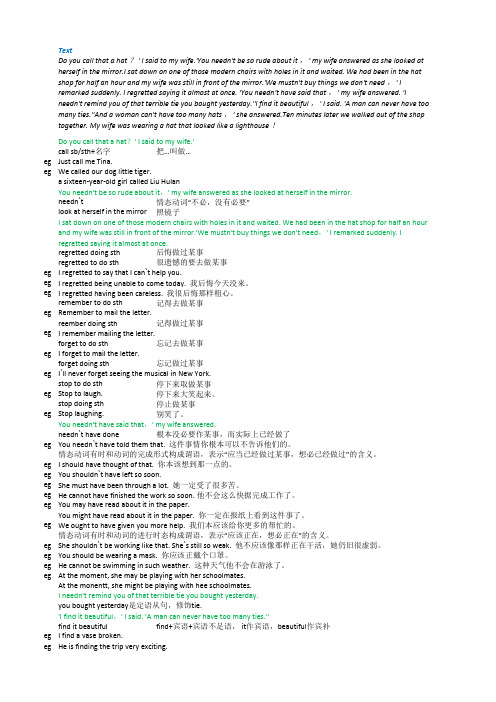
TextDo you call that a hat?' I said to my wife.'You needn't be so rude about it,' my wife answered as she looked at herself in the mirror.I sat down on one of those modern chairs with holes in it and waited. We had been in the hat shop for half an hour and my wife was still in front of the mirror.'We mustn't buy things we don't need,' Iremarked suddenly. I regretted saying it almost at once. 'You needn't have said that,' my wife answered. 'I needn't remind you of that terrible tie you bought yesterday.''I find it beautiful,' I said. 'A man can never have too many ties.''And a woman can't have too many hats,' she answered.Ten minutes later we walked out of the shop together. My wife was wearing a hat that looked like a lighthouse!Do you call that a hat?' I said to my wife.'call sb/sth+名字把…叫做…eg Just call me Tina.eg We called our dog little tiger.a sixteen-year-old girl called Liu HulanYou needn't be so rude about it,' my wife answered as she looked at herself in the mirror.needn`t 情态动词“不必,没有必要”look at herself in the mirror照镜子I sat down on one of those modern chairs with holes in it and waited. We had been in the hat shop for half an hourand my wife was still in front of the mirror.'We mustn't buy things we don't need,' I remarked suddenly. Iregretted saying it almost at once.regretted doing sth后悔做过某事regretted to do sth很遗憾的要去做某事eg I regretted to say that I can`t help you.eg I regretted being unable to come today. 我后悔今天没来。
新概念英语第二册第41课

need
• You needn’t have hurried. • =It was not necessary for you to hurry, but you did. • 你当时不必这么匆忙。
need
• 2.做实义动词时,其变化与一般的实义动词 相同,后接带to的不定式 • need to do… • don’t need to… • Do you need to …? • e.g.我需要稍微休息下。(一般过去时) • I needed to take a short rest. • I needed a short rest.
• remind [ri'maind] v.提醒 提醒某人做某事 • remind sb. of sth. • remind sb. to do sth. • remind sb. that… • 我提醒杰克他曾许下的诺言。 I reminded Jack of his promise.
New Words
• 1、 ‘Do you call that a hat?’ I said to my wife. call 最常用的是“打电话”的意思。
同时,call还可表示 “把…叫做、称为”,常 用于口语和非正式文体中。
2.‘You needn’t be so rude about it, ‘my wife answered as she looked at herself in the mirror. needn’t表示“不必要、没必要”。 英语中实际上有两个 need。
Lesson 41
Do you call that +a +名词? 表示一种轻蔑的含义。
e.g. Do you call that a house ? Do you call that a vase ? Do you call that a chair ?
新概念二第41课课件

03
Text
text
remark v. 对……发表评价
考试链接
I was very enthusiastic about the lecture,
but his remark ____ it chilled me.
A. on
B. for
C. to
D. with
make a remark on sth. 发表对……的看法
You can never be too careful! 你再小心也不为过。
2.remind Please remind me of buying that dress. 请提醒我买那条裙子。
提醒某人做某事 Remind sb. of doing sth. Remind sb to do sth. Remind sb. that+句子
text
'You needn't have said that,' my wife answered. 'I needn't remind you of that terrible tie you bought yesterday.' 'I find it beautiful,' I said. 'A man can never have too many ties.'
text
'And a woman can't have too many hats,' she answered. Ten minutes later we walked out of the shop together. My wife was wearing a hat that looked like a lighthouse!
新概念2第41课课文解析
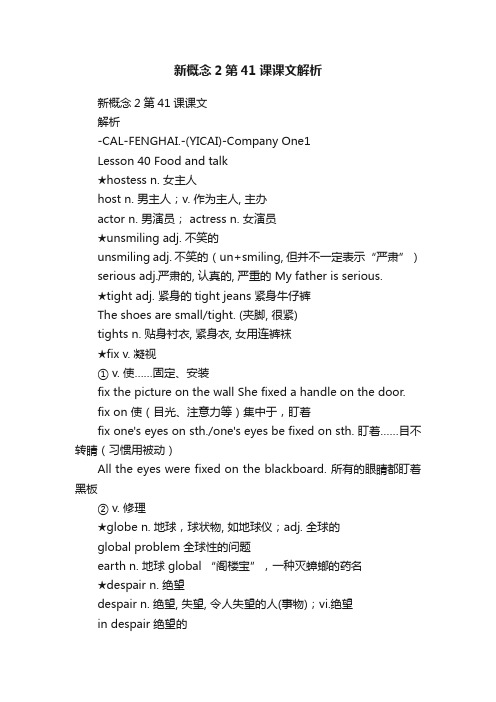
新概念2第41课课文解析新概念2第41课课文解析-CAL-FENGHAI.-(YICAI)-Company One1Lesson 40 Food and talk★hostess n. 女主人host n. 男主人;v. 作为主人, 主办actor n. 男演员; actress n. 女演员★unsmiling adj. 不笑的unsmiling adj. 不笑的(un+smiling, 但并不一定表示“严肃”)serious adj.严肃的, 认真的, 严重的 My father is serious.★tight adj. 紧身的tight jeans 紧身牛仔裤The shoes are small/tight. (夹脚, 很紧)tights n. 贴身衬衣, 紧身衣, 女用连裤袜★fix v. 凝视① v. 使……固定、安装fix the picture on the wall She fixed a handle on the door.fix on 使(目光、注意力等)集中于,盯着fix one's eyes on sth./one's eyes be fixed on sth. 盯着……目不转睛(习惯用被动)All the eyes were fixed on the blackboard. 所有的眼睛都盯着黑板② v. 修理★globe n. 地球,球状物, 如地球仪;adj. 全球的global problem 全球性的问题earth n. 地球global “阁楼宝”,一种灭蟑螂的药名★despair n. 绝望despair n. 绝望, 失望, 令人失望的人(事物);vi.绝望in despair 绝望的sb./sth. is the despair of………让……感到绝望The boy is the despair of his parents. 那男孩的父母对他感到绝望了。
(完整版)新概念应第二册课后练习答案lesson41--50
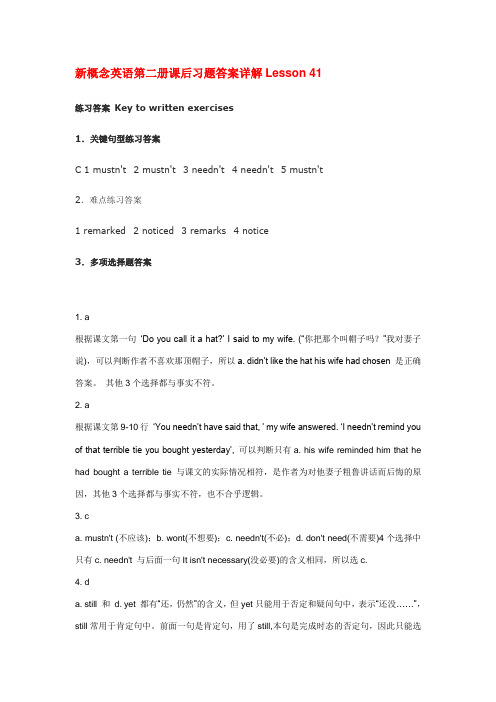
新概念英语第二册课后习题答案详解Lesson 41练习答案Key to written exercises1.关键句型练习答案C 1 mustn't 2 mustn't 3 needn't 4 needn't 5 mustn't2.难点练习答案1 remarked2 noticed3 remarks4 notice3.多项选择题答案1. a根据课文第一句‘Do you call it a hat?’ I said to my wife. (“你把那个叫帽子吗?”我对妻子说),可以判断作者不喜欢那顶帽子,所以a. didn’t like the hat his wife had chosen 是正确答案。
其他3个选择都与事实不符。
2. a根据课文第9-10行‘You needn’t have said that, ’ my wife answered. ‘I needn’t remind you of that terrible tie you bought yesterday’, 可以判断只有a. his wife reminded him that he had bought a terrible tie 与课文的实际情况相符,是作者为对他妻子粗鲁讲话而后悔的原因,其他3个选择都与事实不符,也不合乎逻辑。
3. ca. mustn't (不应该);b. wont(不想要);c. needn't(不必);d. don't need(不需要)4个选择中只有c. needn't 与后面一句It isn't necessary(没必要)的含义相同,所以选c.4. da. still 和d. yet 都有“还,仍然”的含义,但yet只能用于否定和疑问句中,表示“还没……”,still常用于肯定句中。
前面一句是肯定句,用了still,本句是完成时态的否定句,因此只能选b. even(甚至),c. also(也)都不合乎题目意思和语法。
裕兴新概念英语第二册笔记 第四十一课 课文讲解
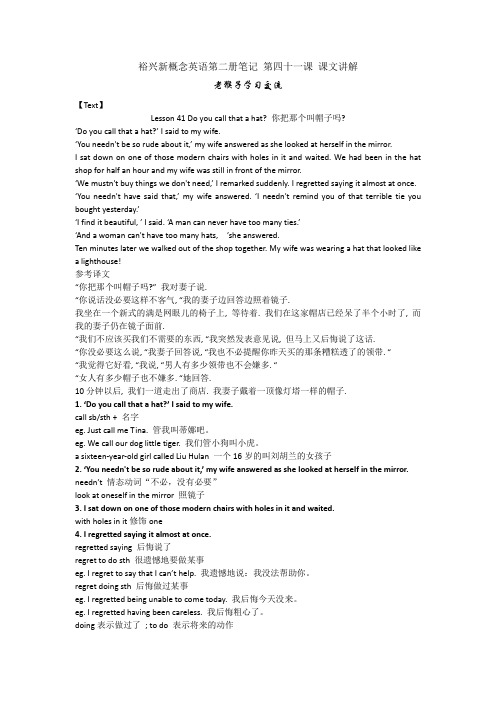
裕兴新概念英语第二册笔记第四十一课课文讲解老猴子学习交流【Text】Lesson 41 Do you call that a hat? 你把那个叫帽子吗?‘Do you call that a hat?’ I said to my wife.‘You needn't be so rude about it,’ my wife answered as she looked at herself in the mirror.I sat down on one of those modern chairs with holes in it and waited. We had been in the hat shop for half an hour and my wife was still in front of the mirror.‘We mustn't buy things we don't need,’ I remarked suddenly. I regretted saying it almost at once. ‘You needn't have said that,’my wife answered. ‘I needn't remind you of that terrible tie you bought yesterday.’‘I find it beautiful, ’ I said. ‘A man can never have too many ties.’‘And a woman can't have too many hats, ’she answered.Ten minutes later we walked out of the shop together. My wife was wearing a hat that looked like a lighthouse!参考译文“你把那个叫帽子吗?” 我对妻子说.“你说话没必要这样不客气, “我的妻子边回答边照着镜子.我坐在一个新式的满是网眼儿的椅子上, 等待着. 我们在这家帽店已经呆了半个小时了, 而我的妻子仍在镜子面前.“我们不应该买我们不需要的东西, “我突然发表意见说, 但马上又后悔说了这话.“你没必要这么说, “我妻子回答说, “我也不必提醒你昨天买的那条糟糕透了的领带. ““我觉得它好看, “我说, “男人有多少领带也不会嫌多. ““女人有多少帽子也不嫌多. “她回答.10分钟以后, 我们一道走出了商店. 我妻子戴着一顶像灯塔一样的帽子.1. ‘Do you call that a hat?’ I said to my wife.call sb/sth + 名字eg. Just call me Tina. 管我叫蒂娜吧。
新概念英语第二册:第41课课文详解及语法解析Word版
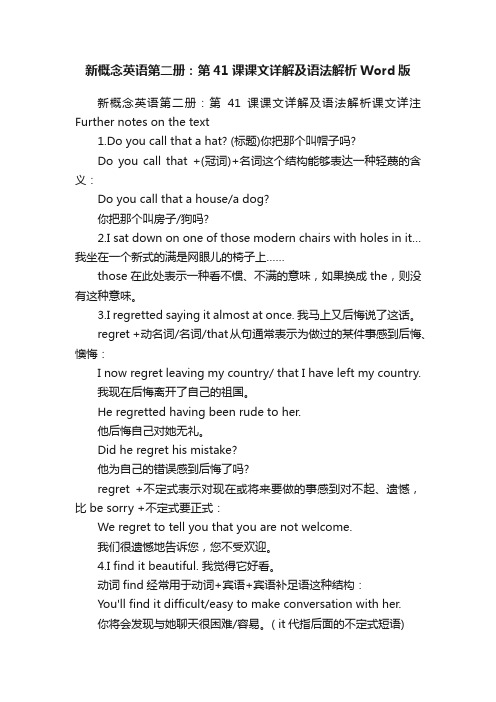
新概念英语第二册:第41课课文详解及语法解析Word版新概念英语第二册:第41课课文详解及语法解析课文详注Further notes on the text1.Do you call that a hat? (标题)你把那个叫帽子吗?Do you call that +(冠词)+名词这个结构能够表达一种轻蔑的含义:Do you call that a house/a dog?你把那个叫房子/狗吗?2.I sat down on one of those modern chairs with holes in it…我坐在一个新式的满是网眼儿的椅子上……those在此处表示一种看不惯、不满的意味,如果换成the,则没有这种意味。
3.I regretted saying it almost at once. 我马上又后悔说了这话。
regret +动名词/名词/that从句通常表示为做过的某件事感到后悔、懊悔:I now regret leaving my country/ that I have left my country.我现在后悔离开了自己的祖国。
He regretted having been rude to her.他后悔自己对她无礼。
Did he regret his mistake?他为自己的错误感到后悔了吗?regret +不定式表示对现在或将来要做的事感到对不起、遗憾,比 be sorry +不定式要正式:We regret to tell you that you are not welcome.我们很遗憾地告诉您,您不受欢迎。
4.I find it beautiful. 我觉得它好看。
动词find经常用于动词+宾语+宾语补足语这种结构:You'll find it difficult/easy to make conversation with her.你将会发现与她聊天很困难/容易。
新概念2 第41课 课件
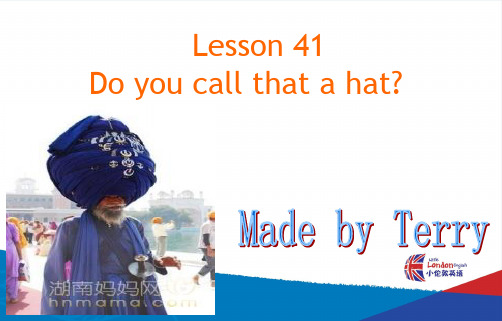
别提了!
text
• 1、Do you call that a hat? • “Do you call that +(冠词)+名词”这个结构可
以表达一种轻蔑的含义:
• Do you call that a dog?
• 2、You needn‘t be so rude about it.(2) • needn’t do… ★★★★★
照镜子
同类词语: look up sth. in the dictionary查字典
Hale Waihona Puke 2)v. 反映His novel is a mirror of his time.
他的小说就是他那个时代的真实写照。
a mirror of···
···的真实写照 3)拓展:reflection n.倒影,映像
课后第8题: She looked in
• We had been in the hat shop for half an hour and my wife was still in front of the mirror.
• 名词修饰名词, 一般用单数: • bookstore书店 • drugstore药店
translation
• 5、“我们不应该买我们不需要的东西, “我突然 发表意见说, 但马上又后悔说了这话.
Title 复习:call 1ca)命ll 名sb.v.+sb.’c把as那ll nt个ahma叫te+做st某h.物 管某人叫· · · · · ·
They decided to call the baby Mark. 他们决定给婴儿取名马克。 2)打电话叫,拜访 v call at/ call on.
新概念英语第二册41课
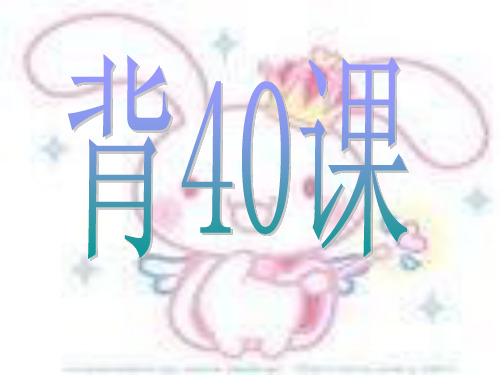
' A new play is -13- to" The Globe" soon,' I said. 'Will you be seeing it ?' ' No,'she answered. 'Will you be -14- your holidays abroad this year ?' I asked. ' No,' she answered. ' Will you be -15-in England?' I asked. ' No,' she answered. In -16-, I asked her -17- she was 18- her dinner. ' Young man,' she answered,' -19- you ate -20- and talked less, we would both enjoy our dinner !'
6.lighthouse n. 灯塔 light-fingered 喜欢顺手牵羊的 light-year 光年 light-ship 信号船 light-headed 头昏眼花的 light-hearted 心情轻松的
练习听力咯!
'Do you -1- that a hat?' I said to my wife. 'You needn't be so -2- about it,' my wife -3- as she looked at herself in the mirror. I -4- down on one of those modern chairs with holes in it and -5-. We had -6- in the hat shop for half an hour and my wife was still in front of the mirror. 'We mustn't buy things we don't need,' I -7- suddenly. I -8-saying italmost at once.
新概念英语第二册听力及翻译Lesson 41

新概念英语第二册听力及翻译Lesson 41Lesson 41 Do you call that a hat? 你把那个叫帽子吗?First listen and then answer the question.听录音,然后回答以下问题。
What kind of shopping does the writer enjoy, do you think?‘Do you call that a hat?’I said to my wife.‘You needn't be so rude about it,’my wife answered as she looked at herself in the mirror.I sat down on one of those modern chairs with holes in it and waited. We had been in the hat shop for half an hour and my wife was still in front of the mirror.‘We mustn't buy things we don't need,’I remarked suddenly.I regretted saying it almost at once.‘You needn't have said that,’my wife answered. ‘I needn't remind you of that terrible tie you bought 10 yesterday.’‘I find it beautiful, ’I said. ‘A man can never have too many ties.’‘And a woman can't have too many hats,’she answered.Ten minutes later we walked out of the shop together. My wife was wearing a hat that looked like a lighthouse!New words and expressions 生词和短语rude adj. 无礼的remark v. 评说mirror n. 镜子remind v. 提醒hole n. 孔lighthouse n. 灯塔Notes on the text 课文注释1 … needn't be so rude…英语中实际上有两个 need。
新概念第二册 Lesson-41课件

B:把…描述为; 把…说成 She calls me lazy and selfish. 她说我又懒又自私。
Explanation
2. What does the hat look like when the wife walked out of the shop?
A lighthouse.
discuss
1.Do you often buy something that you don’t really need? What is it?
• Need • 1、及物动词需要 I need you. • 2、 情态动词必要,和否定连用
need not
• Must • 1、主观表必须 I must help you. • 2、客观表必要 • Candidates must satisfy the general conditions for admission. • 应试者必须满足录取的一般条件。 • Must do ——现在 • Must have done——过去 • • Must not
2、I sat down on one of those modern chairs with holes in it and waited. on the chair 在椅子上 with holes in it 作定语
Jane put a piece of paper with her name and address on it into a bottle.
3、We had been in the hat shop for half an hour and my wife was still in front of the mirror. 名词修饰名词, 一般用单数:bookstore书店, drugstore药店
新概念第二册Lesson 41课件

discuss
1.Do you often buy something that you don’t really need?What is it?
2. Who do you think are generally more extravagant(奢侈的,浪费的), men or women? Why?
We need to tell him the truth. We need to collect the parcel before we leave for England.
3) need doing (表被动) = need to be done
e.g. The cat needs feeding.
-Yes, you need. -No, you needn’t.
注意
在回答由must引起的问题时, 如果 是否定的答复,不能用mustn't , 而 需要用needn't或don't have to . 因 为mustn't 表示禁止。
模拟题 大考验
1. You _____ take an umbrella, I am sure it won’t rain.
花容月貌 无比幸福 胃口极好 雪白 一片漆黑 易如反掌 滚烫 无忧无虑 忙忙碌碌
Grammar
need 1.作实意动词,需要 1)need + sth. e.g. I need some time to think
about it. We need his help.
2) need to do e.g.
remark v. 评说
1. I couldn’t help remarking on her beauty.
新概念英语第二册 Lesson 41学习资料PPT文档48页
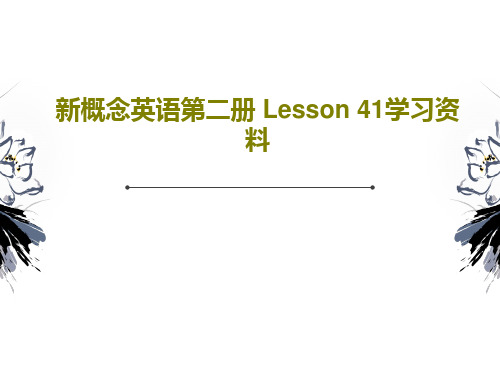
61、奢侈是舒适的,否则就不是奢侈 。——CocoCha nel 62、少而好学,如日出之阳;壮而好学 ,如日 中之光 ;志而 好学, 如炳烛 之光。 ——刘 向 63、三军可夺帅也,匹夫不可夺志也。 ——孔 丘 64、人生就是学校。在那里,与其说好 的教师 是幸福 ,不如 说好的 教师是 不幸。 ——海 贝尔 65、接受挑战,就可以享受胜利的喜悦 。——杰纳勒 尔·乔治·S·巴顿
新概念英语第二册 Lesson 41学习资 料
36、“不可能”这个字(法语是一个字 ),只 在愚人 的字典 中找得 到。--拿 破仑。 37、不要生气要争气,不要看破要突 破,不 要嫉妒 要欣赏 ,不要 托延要 积极, 不要心 动要行 动。 38、勤奋,机会,乐观是成功的三要 素。(注 意:传 统观念 认为勤 奋和机 会是成 功的要 素,但 是经过 统计学 和成功 人士的 分析得 出,乐 观是成 功的第 三要素 。
谢谢!
新概念第二册第41课完整ppt课件

• 1、 ‘Do you call that a hat?’ I said to my wife. call 最常用的是“打电话”的意思。 同时,call还可表示 “把…叫做、称为”,常用 于口语和非正式文体中。
.
2.‘You needn’t be so rude about it, ‘my wife answered as she looked at herself in the mirror.
.
2) adj. 粗鲁的,猛烈的,突然的 rude treatment 粗鲁的对待 a rude shock 猛烈的打击 I did not intend to be rude. 我并不想粗鲁无礼。 3) adj. 未加工的,天然的 rude cotton 原棉 They are buying rude cotton. 他们正在收购原棉。 People of the Stone Age used rude tools. 石器时代的人使用粗糙简陋的工具。
Remind her to come earlier tomorrow morning. reminder [rɪ‘maɪndə] n. 提示,提醒 This is only a reminder. 这仅仅是一个提醒。 .
lighthouse [‘laɪt,haʊs] n.灯塔
A lighthouse must be built at that dangerous place. 在那个容易出事的地方一定得修建灯塔。 A lighthouse was flashing in the distance. light-fingered 喜欢顺手牵羊(口) light-headed 头晕眼花 light-hearted 心情轻松的 light- year 光年 light- ship 信号船
新概念第二册lesson 41 Do you call that a hat

• The shoes are very tight. • Fix your eyes on the road and we will be much safer. • My computer doesn’t work.Could you fix it up for me?
aloud
LESSON 41 Do you call that a hat?
New Words
• rude
Adj.
[ru:d]
1.粗野的,粗鲁的,无礼的 我并不想粗鲁无礼。 I did not intend to be rude. 2.粗糙的,简陋的 石器时代的人使用粗糙简陋的工具。 People of the Stone Age used rude tools. 3.未加工的,天然的 他们正在收购原棉。 They are buying rude cotton.
Key structures
• mustn‘t 不准 (强制性) 例:You mustn‘t go there.你不准去那儿 • needn‘t 不需要,不用 例:You needn't go there.你不用去那儿
P188 Do some exercises→
mustn't和 needn't:
1.What kind of shopping does the writer enjoy, do you think?
Shopping for himself.
lesson 41 新概念英语二41课
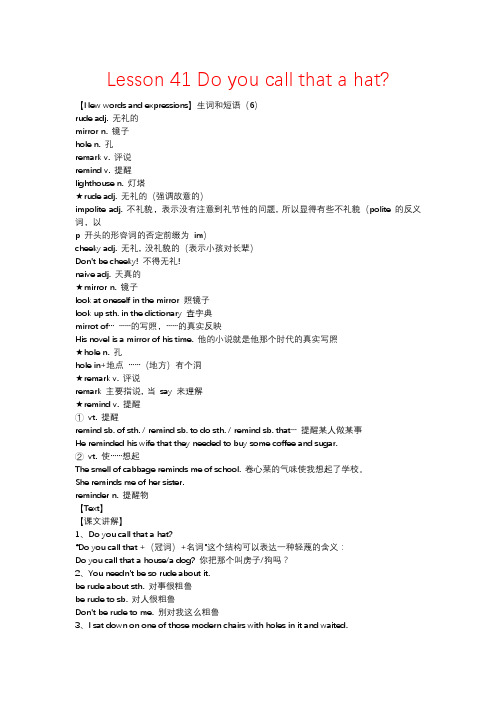
Lesson 41 Do you call that a hat?【New words and expressions】生词和短语(6)rude adj. 无礼的mirror n. 镜子hole n. 孔remark v. 评说remind v. 提醒lighthouse n. 灯塔★rude adj. 无礼的(强调故意的)impolite adj. 不礼貌,表示没有注意到礼节性的问题, 所以显得有些不礼貌(polite 的反义词,以p 开头的形容词的否定前缀为im)cheeky adj. 无礼, 没礼貌的(表示小孩对长辈)Don’t be cheeky! 不得无礼!naive adj. 天真的★mirror n. 镜子look at oneself in the mirror 照镜子look up sth. in the dictionary 查字典mirrot of………的写照,……的真实反映His novel is a mirror of his time. 他的小说就是他那个时代的真实写照★hole n. 孔hole in+地点……(地方)有个洞★remark v. 评说remark 主要指说, 当say 来理解★remind v. 提醒①vt. 提醒remind sb. of sth. / remind sb. to do sth. / remind sb. that…提醒某人做某事He reminded his wife that they needed to buy some coffee and sugar.②vt. 使……想起The smell of cabbage reminds me of school. 卷心菜的气味使我想起了学校。
She reminds me of her sister.reminder n. 提醒物【Text】【课文讲解】1、Do you call that a hat?“Do you call that +(冠词)+名词”这个结构可以表达一种轻蔑的含义:Do you call that a house/a dog? 你把那个叫房子/狗吗?2、You needn't be so rude about it.be rude about sth. 对事很粗鲁be rude to sb. 对人很粗鲁Don't be rude to me. 别对我这么粗鲁3、I sat down on one of those modern chairs with holes in it and waited.on the chair 在椅子上with holes in it 作定语Jane put a piece of paper with her name and address on it into a bottle.4、We had been in the hat shop for half an hour and my wife was still in front of the mirror. 名词修饰名词, 一般用单数:bookstore 书店,drugstore 药店,5、I regretted saying it almost at once.regret doing sth./名词/that 从句后悔已经做了某事,表示对做过的事感到遗憾Did he regret his mistake?215新概念英语第二册笔记I now regret leaving my country/that I have left my country.regret to do sth. 表示对现在或将来要做的事感到对不起、遗憾,比be sorry to do sth.要正式:We regret to tell you that you are not welcome. 我很遗憾地告诉您,您不受欢迎。
新概念英语第二册 第41课时
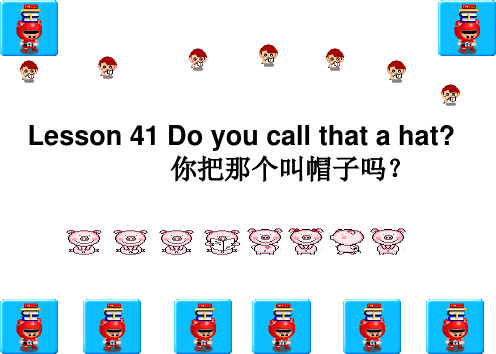
1.‘Do you call that a hat?’ I said to my wife. ‘You needn’t be so rude about it, ‘my wife answered as she looked at herself in the mirror. … needn’t be so rude…这里的needn’t表示“不必要、没必要”。
我坐在一个新式的满是网眼儿的椅子上,等待着。 我们在这家帽店已经呆了半个小时了,
而我的妻子仍在镜子面前。
'We mustn't buy things we don't need,' I remarked suddenly. I regretted saying it almost at once. 'You needn't have said that,' my wife answered. 'I needn't remind you of that terrible tie you bought yesterday.'
“你把那个叫帽子吗?”我对妻子说。 “你说话没必要这样不客气,”我的妻子边回答边照着镜子。
I sat down on one of those modern chairs with holes in it and waited. We had been in the hat shop for half an hour and my wife was still in front of the mirror.
语法讲解:need主要有两种用法
1.作为“实义动词”表示“需要”。
2.在needn’t结构中need作为“情态动词”。 needn’t用于否定句,表示“不必”、“没必 要”.
新概念英语第二册课堂笔记-第41课
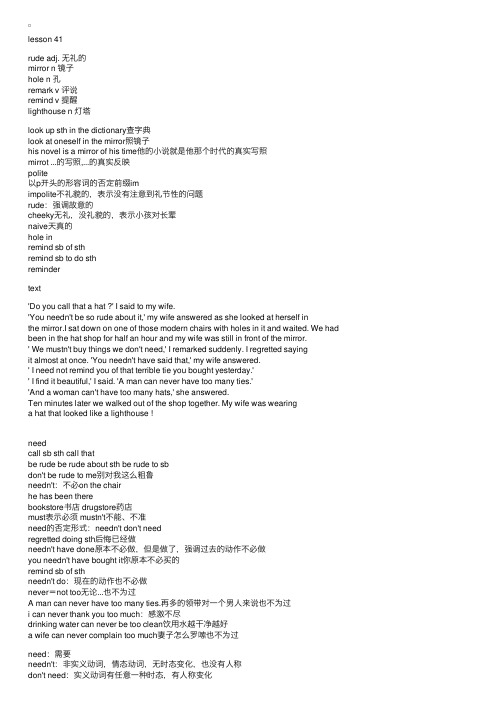
lesson 41rude adj. ⽆礼的mirror n 镜⼦hole n 孔remark v 评说remind v 提醒lighthouse n 灯塔look up sth in the dictionary查字典look at oneself in the mirror照镜⼦his novel is a mirror of his time他的⼩说就是他那个时代的真实写照mirrot ...的写照,...的真实反映polite以p开头的形容词的否定前缀imimpolite不礼貌的,表⽰没有注意到礼节性的问题rude:强调故意的cheeky⽆礼,没礼貌的,表⽰⼩孩对长辈naive天真的hole inremind sb of sthremind sb to do sthremindertext'Do you call that a hat ?' I said to my wife.'You needn't be so rude about it,' my wife answered as she looked at herself inthe mirror.I sat down on one of those modern chairs with holes in it and waited. We had been in the hat shop for half an hour and my wife was still in front of the mirror.' We mustn't buy things we don't need,' I remarked suddenly. I regretted sayingit almost at once. 'You needn't have said that,' my wife answered.' I need not remind you of that terrible tie you bought yesterday.'' I find it beautiful,' I said. 'A man can never have too many ties.''And a woman can't have too many hats,' she answered.Ten minutes later we walked out of the shop together. My wife was wearinga hat that looked like a lighthouse !needcall sb sth call thatbe rude be rude about sth be rude to sbdon't be rude to me别对我这么粗鲁needn't:不必on the chairhe has been therebookstore书店 drugstore药店must表⽰必须 mustn't不能、不准need的否定形式:needn't don't needregretted doing sth后悔已经做needn't have done原本不必做,但是做了,强调过去的动作不必做you needn't have bought it你原本不必买的remind sb of sthneedn't do:现在的动作也不必做never=not too⽆论...也不为过A man can never have too many ties.再多的领带对⼀个男⼈来说也不为过i can never thank you too much:感激不尽drinking water can never be too clean饮⽤⽔越⼲净越好a wife can never complain too much妻⼦怎么罗嗦也不为过need:需要needn't:⾮实义动词,情态动词,⽆时态变化,也没有⼈称don't need:实义动词有任意⼀种时态,有⼈称变化need i...?(情态)do i need...?实义动词情态动词后⾯⼀定要加动词原形在实义动词后⾯再加⼀个实义动词,就在后⾯加to doneed i go out?do i need to go out?情态动词后⾯不能直接⽤名词做宾语实义动词后⾯可以直接加名词we don't need things(名词)...you don't need to beneedn't have done:过去不必做,但是做了mustn't 不准can't :不可能you don't...:事实key structuresmust可能等于have to 表⽰必须,不等于have to时表⽰推测1、对现在和将来加原形2、对正在be doing3、对过去have done4、对过去正在have been doingbe bad for对什么有害smoking is bad for your health抽烟有害你的健康observe:仔细地看multiple choices3......do you have to...?yes,i do/no,i don'thave to 必须do you have to...?no,i don't have to do sthmustn't不准 don't have to 不必must=have to必须英⽂中要么助动词之后所有地东西都省略,要么省到不定式标志would you like to do sth?yes,i'd like tono,i don't/no,i don't need todo you want to go to school?yes,i do/yes,i want towould you like to see the menu?yes,i'd like to(后结动词would you like some bananas?yes,i’d like(后结名词)do you need the hat?no,i needn't7......can never:不可能=can'tunable:不可能,be able(unable) toimpossibleimprobable,:不太可能probably很有可能incapable:没有能⼒,be capable of8......reflect:发射,reflection:反射地东西idol:偶像imagination:想象picture:照⽚,图象11......wear/dress/put on/have on穿wear(状态)dress,dress sb:给某⼈穿⾐服,强调动作put on(动作)have sth on(状态)in a green coatshe is in a green coatbe in+⾐服(状态)12......match:与...相配lien:与...做⽐较,compare,liken sth to another thingwe liken the hat to a lighthouseresemble:像 vt a resemble bappear:显得,similar:与...相似,be similar to remark/noticenotice:看remark:说make rude remark(粗话)call one's name:骂⼈say F wordsfail to do:没有能够,表⽰强烈地肯定,not fail to you can not fail to notict it。
- 1、下载文档前请自行甄别文档内容的完整性,平台不提供额外的编辑、内容补充、找答案等附加服务。
- 2、"仅部分预览"的文档,不可在线预览部分如存在完整性等问题,可反馈申请退款(可完整预览的文档不适用该条件!)。
- 3、如文档侵犯您的权益,请联系客服反馈,我们会尽快为您处理(人工客服工作时间:9:00-18:30)。
新概念英语第二册:第41 课课文详解及语法解析课文详注 Further notes on the text
1.Do you call that a hat? (标题)你把那个叫帽子吗?
Do you call that +(冠词)+名词这个结构能够表达一种轻蔑的含义:
Do you call that a house/a dog?
你把那个叫房子 / 狗吗 ?
2.I sat down on one of those modern chairs with holes
in it 我坐在一个新式的满是网眼儿的椅子上
those 在此处表示一种看不惯、不满的意味,如果换成 the ,则没有这种意味。
3.I regretted saying it almost at once.我马上又后悔说了这话。
regret + 动名词 / 名词 /that 从句通常表示为做过的某件事感到后悔、懊悔:
I now regret leaving my country/ that I have left
my country.
我现在后悔离开了自己的祖国。
He regretted having been rude to her.
他后悔自己对她无礼。
Did he regret his mistake?
他为自己的错误感到后悔了吗?
regret +不定式表示对现在或将来要做的事感到对不起、遗憾,
比 be sorry + 不定式要正式:
We regret to tell you that you are not welcome.
我们很遗憾地告诉您,您不受欢迎。
4.I find it beautiful.我觉得它好看。
动词 find经常用于动词+宾语+宾语补足语这种结构:
You'll find it difficult/easy to make conversation with
her.
你将会发现与她聊天很困难/ 容易。
( it代指后面的不定式短语)
I find this book very interesting.
我觉得这本书很有趣。
5.A man can never have too many ties.男人有多少领带也不
会嫌多。
cannot/can never too ( 固定结构 ) 表示“无论怎么也不会过
度”:
A woman can't have too many hats.
女人有多少帽子也不嫌多。
You can't be too careful in doing your work.
你工作越小心越好。
语法Grammar in use
must, have(got) to 与need
在第17 课的语法中,我们学习了情态助动词must 和
have(got)to的一些用法,知道它们能够表达“必须”、“不得不”
等含义, must 还可用于表示推测。
在表达“必要”、“不必要”等含
义时,除了可用 must 和 have(got)to 以外,还能够用 need。
need 只有情态助动词的部分特征,仅用于某些疑问句和否定句。
need 用于疑问句时,问者往往希望得到
否定的回答:
Need you leave so soon?
你有必要这么早就走吗 ?( 希望不必 ) 用 need 的一般疑问句的肯定形式的回答能够用 must/had to ,否定形式的回答能够用 needn't :
Need I type this letter again?
这封信需要我再打一遍吗?
Yes,you must.
是的,你必须再打一遍。
No,you needn't.
不,你不必了。
need 一般情况下作完全动词:
I need to go to the dentist this morning.
今天上午我需要去看牙。
表示必要时, must 的语气比 need 要强:
I must go to the dentist this morning.
今天上午我必须去看牙。
用 must 而不用 mustn't 的一般疑问句能够用
:
must/have to 或needn't 来回答,
Must I set off now?
我现在必须出发吗 ?
Yes,you must / have to.
是的,你现在必须 / 得出发。
No,you needn't.
不,你不必。
“不必要”可用needn't, don't have to来表示:
You needn't/don't have to work such long hours.
你不必工作那么长时间。
这种句型可用来表示说话人让对方选择或允许对方能够不做某事的主观意图。
它的完成式和过去式分别为 needn't have, didn't have to 和 didn't need to :
I needn't have gone to the office yesterday.
I didn't have to/didn't need to go to the office
yesterday.
昨天我没必要去办公室。
( 言下之意是虽然我去了但这是不必要的)
mustn't表示绝对禁止。
在说话人看来,根本没有选择余地:
You mustn't use that bicycle,It's broken.
你不能骑那辆自行车。
它坏了。
You needn't have told me that.I know it is.
你没必要告诉我。
我知道它坏了。
试体会下列例句中“必要”、“不必要”的表达方法:
Why don't you buy a coat?
你为什么不买件外衣呢 ?
I'd like to buy one,but I don't really need any. 我想买一件,但我真的并不需要。
